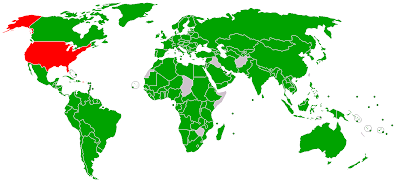
We've screwed up. Big time. If this Guardian article is correct, and US lawmakers have really given up hope of going to Copenhagen ready to commit to strict, binding climate change legislation, we've made a very grave mistake.
According to the article, Todd Stern, the State Department's Special Envoy for Climate Change, said, "It doesn't look like [a treaty is] on the cards for December." He offered instead that negotiators were intent on producing a blueprint in Copenhagen that would lead to a binding legal agreement "perhaps next year or as soon as possible."
I'm sorry Mr. Stern, but that is simply not good enough.
US participation at Copenhagen is the keystone of the success of the climate treaty - without bold US support, negotiations will surely fall apart. As is the case in most international negotiations, world leaders look to the United States to set the precedent for action (see how countries compare on their climate positions here). As troubling as this reality may be, it makes perfect sense. Why should other nations commit to emissions standards when the richest country, which also happens to be the world's second-largest producer of greenhouse gasses, refuses to? And as we have already witnessed during the preliminary climate meetings in Barcelona last week, leaders of developing nations are prepared to oppose any negotiations in which developed countries do not promote strict emissions standards.
Given the current US attitude, whatever comes out of Copenhagen this December will at best become another Kyoto Protocol: an international climate treaty (December 1997) that the US refused to ratify and it was thus rendered largely ineffective. Below is the map of countries who ratified the Kyoto treaty (green) and the only one who didn't (red):

To put it bluntly (from the Guardian):
The US shift resets expectations for what will be accomplished at Copenhagen, once billed by the UN as a last chance to avoid catastrophic global warming.
We're the game changers. We're the movers and the shakers. We're the country all other countries look to for guidance and direction, and through our indecision and delay we've let down the international community (not to mention slapped all of these people in the face).
Speaking in Barcelona, Artur Runge-Metzger, the European Commission's chief negotiator, said: "It is a Catch-22 situation. People are waiting for each other so it is difficult to blame anyone. [But] the US position is significant. Clearly the US has been slowing things down." It's as if world leaders are all standing around looking at one another to take the first, definitive step forward. Not only has the US demonstrated an unwillingness to step forward: we've taken a step back.
For Connie Hedegaard, Denmark's Minister for Climate and Energy and COP15 President, failure is not an option:
“If the whole world comes to Copenhagen and leaves without making the needed political agreement, then I think it’s a failure that is not just about climate. Then it’s the whole global democratic system not being able to deliver results in one of the defining challenges of our century. And that is and should not be a possibility. It’s not an option."
She eloquently and accurately frames what is at stake in the video below:
Senator John Kerry (D-MA) said the reduced role for Copenhagen could work out to the world's advantage by giving America, China, and the international community more time to co-ordinate their efforts. But as Hedegaard says, complexity is no excuse for complacency. Just because climate change is a terrifyingly complicated issue, that doesn't mean it's okay to postpone negotiations. In some ways the damage has already been done - we may very well have sacrificed a unique opportunity to form a global pact to reduce greenhouse gas emissions by failing to work on this issue domestically in the past year. Of course it is possible for other countries to pick up the banner and propose tough emissions standards in December, but without US support the treaty will fail to mark considerable progress.
No comments:
Post a Comment